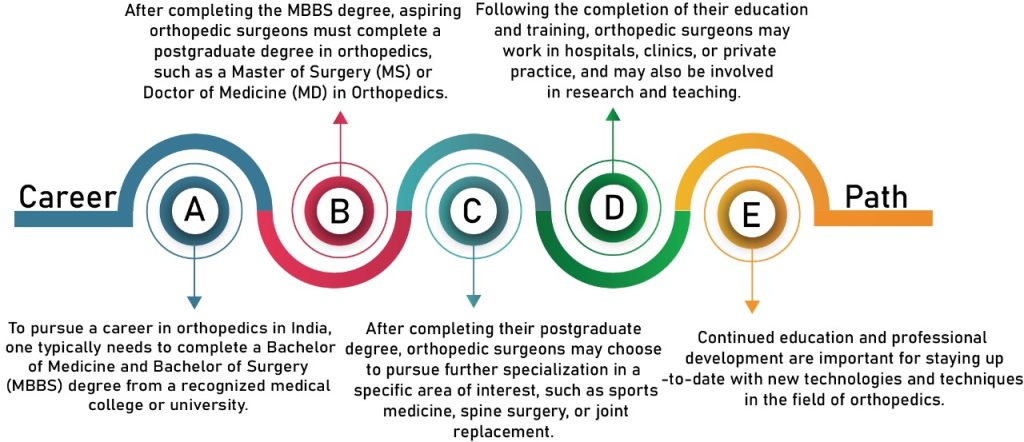Orthopedics is a branch of medicine that deals with the prevention, diagnosis, and treatment of musculoskeletal disorders, which affect the bones, joints, muscles, tendons, ligaments, and nerves. Orthopedic surgeons are trained to treat a wide range of conditions, including fractures, dislocations, sprains, strains, arthritis, spinal disorders, sports injuries, and congenital conditions. They use a variety of techniques to treat these conditions, including surgery, medication, physical therapy, and rehabilitation. Orthopedics plays an important role in improving the quality of life of patients by restoring mobility, relieving pain, and preventing disabilities.

Work description
The work of an orthopedic surgeon involves the diagnosis, treatment, and management of musculoskeletal conditions. They may work in hospitals, clinics, or private practice, and typically see patients of all ages, from infants to the elderly.
Orthopedic surgeons use a variety of tools and techniques to diagnose and treat their patients, including imaging tests such as X-rays, CT scans, and MRIs.
Treatment options may range from non-surgical approaches such as medication and physical therapy to more invasive procedures such as joint replacement surgery.
Orthopedic surgeons may also work closely with other healthcare professionals, such as physical therapists, to provide comprehensive care for their patients.
Additionally, they may be involved in research and teaching to advance the field of orthopedics.
High Demand
There is a high demand for orthopedic surgeons due to an aging population and an increase in sports-related injuries.
High earning potential
Orthopedic surgeons are among the highest-paid medical professionals due to the complex and specialized nature of their work.
Variety of subspecialties
There are several subspecialties within orthopedics, allowing for the opportunity to focus on a particular area of interest, such as sports medicine, joint replacement, or spine surgery.
Ability to make a significant impact
Orthopedic surgeons have the ability to improve patients’ quality of life by restoring mobility and reducing pain.
Technologically advanced
The field of orthopedics is continually evolving with new technologies and techniques, providing opportunities for learning and professional growth.
Job satisfaction
The potential to specialize in areas such as sustainable design, structural engineering, or building systems design.
Long training period
Becoming an orthopedic surgeon requires a significant investment of time and effort, with an average of 14 years of education and training required.
High stress and demanding work
Orthopedic surgery can be high stress and physically demanding, requiring long hours and a high level of focus and attention to detail.
Risk of litigation
As with any medical profession, there is a risk of litigation due to the nature of the work and the potential for complications or unfavorable outcomes.
Patient expectations
: Patients may have high expectations for outcomes, which can lead to pressure and stress for the orthopedic surgeon.
Work-life balance
The demanding nature of the job can make it challenging to maintain a healthy work-life balance.
Eye strain and other physical health issues
The potential for competition for jobs, particularly in areas with high demand for architectural engineering services.
The cost of pursuing orthopedics in India can vary depending on the type of institution and program chosen. Generally, pursuing an MD or MS in Orthopedics from a government institution in India can cost anywhere from Rs. 50,000 to Rs. 2 lakhs per year, while pursuing the same degree from a private institution can cost significantly more, ranging from Rs. 10 lakhs to Rs. 25 lakhs per year.
In addition to tuition fees, there may also be other expenses such as accommodation, books and study materials, and other living expenses. Scholarships and financial aid may be available to help offset some of these costs, and it is recommended to research and compare options carefully before making a decision.
[wpcharts type=”horizontalbarchart” bgcolor=”red:gray:yellow,blue:gray:yellow,random:gray:yellow,purple:gray:yellow” min=”0″ legend=”true” titles=”2 year , 5 year” values=”3,7,5,12″]
Orthopedics is one of the highest-paying medical professions in India, with significant earning potential for experienced and skilled professionals. According to reports, the average salary for an orthopedic surgeon in India ranges from Rs. 10 lakhs to Rs. 50 lakhs per year, depending on factors such as experience, location, and institution. Private practice can also offer higher earning potential, with some established orthopedic surgeons earning several lakhs of rupees per month.
However, it is important to note that earning potential can vary widely and is dependent on a variety of factors, including specialization, reputation, and patient base. Additionally, the costs associated with education and training for this profession should also be taken into account when considering the earning potential.
[wpcharts type=”horizontalbarchart” bgcolor=”red:gray:yellow,blue:gray:yellow,random:gray:yellow,purple:gray:yellow” min=”0″ legend=”false” titles=”Entry-Level, Mid-Career, Senior-Level ” values=”5,15,25,35,45,55″]
Strong academic background in science and mathematics.
Excellent problem-solving skills.
Excellent problem-solving skills.
Attention to detail and ability to focus for long periods.
Physical dexterity and good hand-eye coordination.
Compassion and empathy for patients.
Willingness to work long hours and deal with high stress situations.
Inability to handle stress and pressure.
Lack of attention to detail or focus.
Poor communication or interpersonal skills.
Lack of interest in continuous learning and professional development.
Physical limitations or disabilities that may affect manual dexterity.
Lack of compassion or empathy for patients.
Difficulty with long hours or shift work.
Work-life balance
The work-life balance of an orthopedic surgeon can vary depending on a number of factors, such as the type of practice, patient volume, and personal priorities. Orthopedic surgeons may work long hours, particularly during peak times such as after major sports events, but they may also have periods of downtime. They may be on call or required to work weekends and holidays, depending on their practice or institution. Finding a balance between work and personal life can be challenging, particularly for those in private practice or in leadership roles. However, many orthopedic surgeons prioritize their personal time and make efforts to maintain a healthy work-life balance through strategies such as setting boundaries, delegating tasks, and taking time off for self-care and family.

Helping patients recover from injuries and improve their quality of life.
Contributing to advancements in medical technology and techniques.
Working in a high-demand and growing field with job security.
Earning a high salary and having potential for career growth.
Building relationships with patients and colleagues in the medical field.
Providing opportunities for research and teaching.
Sports Medicine
Focusing on injuries and conditions related to sports and physical activity, including joint injuries, ligament tears, and stress fractures.
Spine Surgery
Specializing in surgeries and treatments for conditions affecting the spine, such as herniated discs, spinal stenosis, and scoliosis.
Joint Replacement
Specializing in surgeries to replace damaged or diseased joints, such as hip or knee replacements.
Pediatric Orthopedics
Focusing on conditions and injuries affecting children and adolescents, including growth plate fractures and scoliosis.
Trauma Surgery
Focusing on emergency situations involving musculoskeletal injuries, such as fractures, dislocations, and soft tissue injuries.
Conclusion:
In conclusion, orthopedics can be a fulfilling and rewarding career choice for those with a passion for helping patients recover from musculoskeletal injuries and conditions. The field offers a range of specializations and opportunities for professional growth, with a high demand for skilled orthopedic surgeons in many regions. While the profession requires a strong academic and personal skillset, those who are dedicated to continuous learning and patient care can find great success and satisfaction in a career in orthopedics



